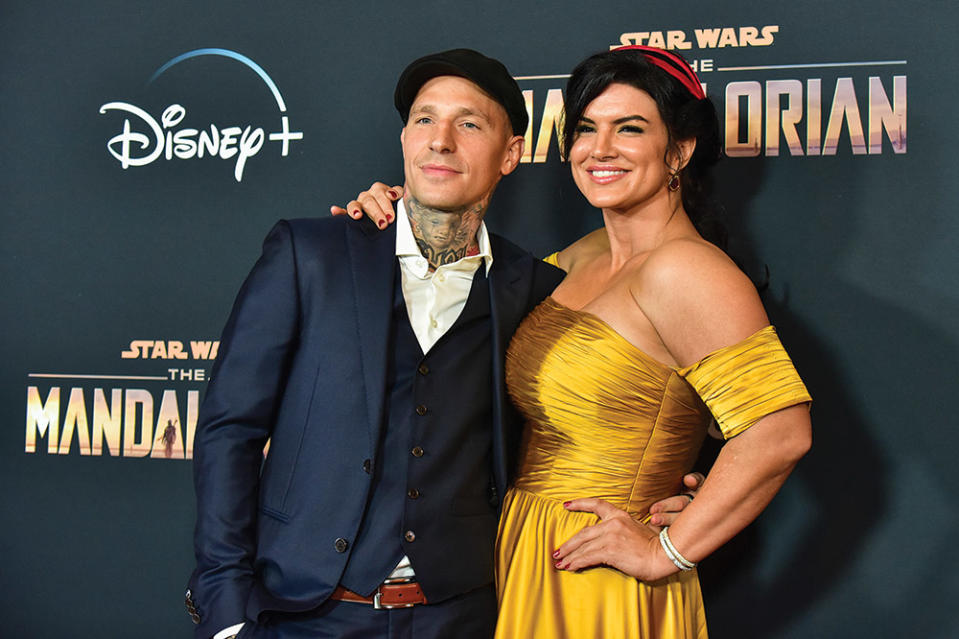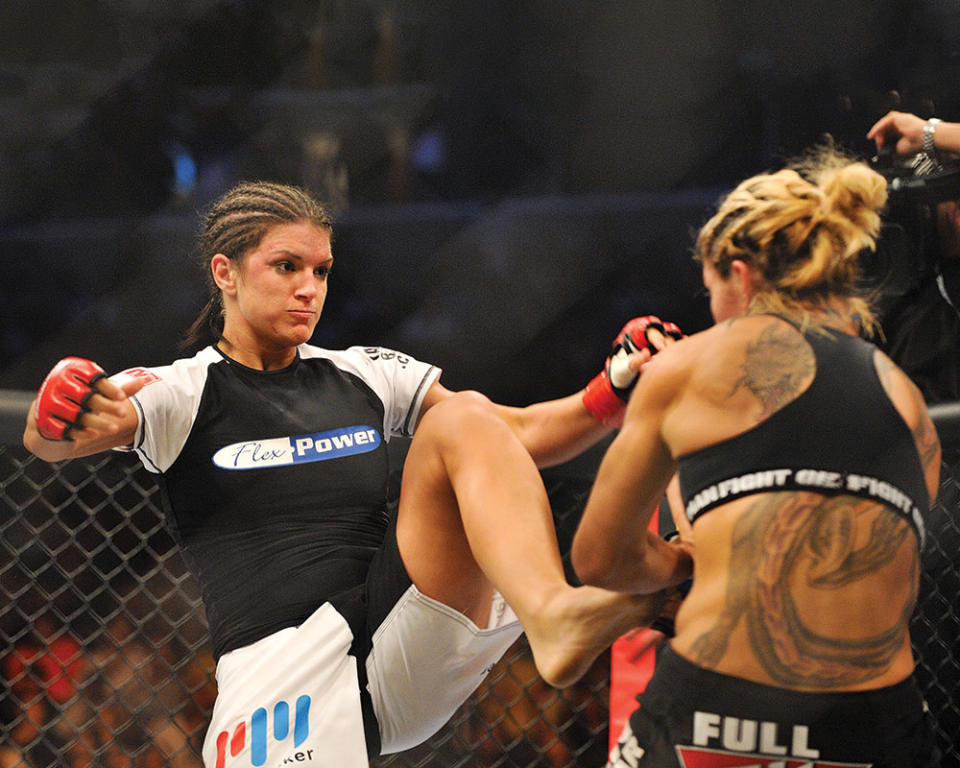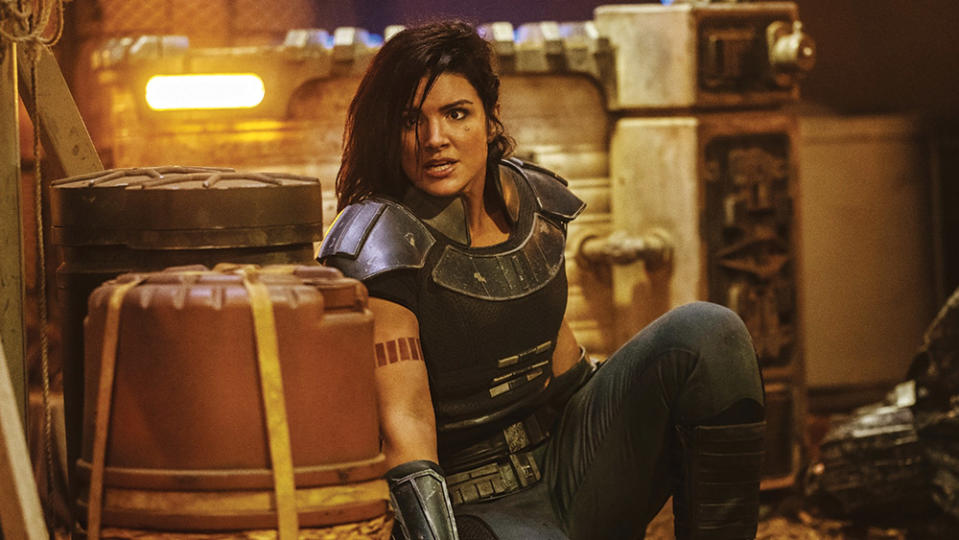Gina Carano on Getting Sacked From Star Wars and Her Grudge Match With Disney

In late 2018, Gina Carano — a pioneering mixed martial arts champion who successfully transitioned to acting in Steven Soderbergh’s 2011 film Haywire — was blissfully staring up at the stars. They weren’t actual stars, but digital facsimiles projected onto a massive, domed screen — all part of a groundbreaking new effects technology from Industrial Light & Magic known as the Volume. Carano lived in Hermosa Beach at the time, just 15 minutes from Manhattan Beach Studios, where she was working on a top-secret sci-fi project, code name Project Huckleberry. But thanks to the Volume, she might as well have been 3 million light years away.
“I loved disappearing into this strange world of spaceships and galaxies and alien characters,” Carano, 41, tells me in a suite at The Beverly Hills Hotel. She’s wrapped in a gauzy shawl and curled up barefoot on a couch, far more subdued and cordial in person than her feisty persona, both onscreen and online, might suggest. Christopher Nolan’s Oppenheimer — her “favorite movie” — is playing silently on a TV in the background, a winter rainstorm tapping against the window. “I loved everybody I worked with,” she continues. “The directors, the actors, the sound department — everybody got along. It was just amazing.”
More from The Hollywood Reporter
Don Lemon Says Elon Musk Canceled His X Show, Hours After Interview Taped for Debut Episode
Disney Punches Back at Nelson Peltz: Video Frames Activists as "Disruptive and Destructive"
Project Huckleberry would premiere under its actual name — The Mandalorian — as the flagship offering from Disney’s new streaming service, Disney+, on Nov. 12, 2019. The Star Wars series from writer-director Jon Favreau became an instant cultural obsession. Among its breakout characters were an adorable animatronic alien named Grogu (but dubbed “Baby Yoda” by the internet) and Carano’s character, Cara Dune, a mercenary from Princess Leia’s obliterated home planet of Alderaan.
A little over a year later, Carano’s travels to galaxies far, far away came to an end. The unraveling began as Carano, a heavy social media communicator with right-libertarian-leaning views (though she resists labeling her politics), bumped up against the corporate culture at Disney with an endless string of controversies involving tweets and Instagram posts on highly sensitive and divisive topics like COVID-19 vaccines and masking (she was against both and remains stridently anti-vax); her views on Black Lives Matter and the transgender rights movement (she says she would not bend to pressure to announce her pronouns or tweet activist hashtags); and the results of the 2020 presidential elections (amid Donald Trump’s disproven claims of election-rigging, she tweeted “make voter fraud end in 2020”).
For a while, things had appeared to settle down. Carano even fielded a call from Favreau, who said her “life is about to change” with the launch of her own Mandalorian spinoff, Rangers of the New Republic. Citing the pending lawsuit, Favreau declined to comment for this story. Still, she remained on thin ice at a company that placed an emphasis on liberal values and inclusivity, at a time when tensions over identity politics were at an all-time high. Carano felt unfairly targeted and bullied both by the public and her work peers, and her instinct was to continue to fight for herself — just as she’d always done in the ring. The final straw came with a meme she stumbled across and reposted to Instagram Stories and to Fleets (Twitter’s version of Stories) on Feb. 10, 2021. It featured a photo of a terrified Jewish woman being chased by a boy holding a bat during the Holocaust. “How is this any different from hating someone for their political views?” the accompanying caption asked. The posts were widely circulated, launching a Twitter hashtag campaign — #FireGinaCarano.
She was. But the news of her termination was not relayed directly to her, she says. Instead, she learned of it online along with the rest of the world. “Gina Carano is not currently employed by Lucasfilm and there are no plans for her to be in the future,” read the statement, attributed to a Lucasfilm spokesperson. “Nevertheless, her social media posts denigrating people based on their cultural and religious identities are abhorrent and unacceptable.” She was dropped by her agency, UTA, and her Hollywood law firm, Ziffren Brittenham. Carano was canceled.
“I just laid down and cried and cried,” Carano recalls. “I curled into a fetal position. It’s not that I didn’t think that something like that could happen. It was that I couldn’t imagine they would put out this horrendous statement about me after working with me — the most powerful entertainment company in the world saying that about me.” Carano sold her place in Hermosa Beach and bought an RV. She spent three weeks driving across the country, destination Nashville, where she met with The Daily Wire, the right-wing media company co-founded in 2015 by Ben Shapiro and Jeremy Boreing. They hired her to star in and produce a film — a Western from director Michael Polish called Terror on the Prairie, which debuted on the Daily Wire website June 14, 2022. Much mockery was made online of the film grossing only $804 — a number that was seemingly taken from a box office website, which Carano says had mistakenly cited a single theatrical screening where no admission was charged. The plan had always been to distribute the film directly to Daily Wire subscribers.
And that was the last Hollywood had heard of Carano — yet another cautionary casualty of the culture wars. That is, until one month ago, when Carano sued Disney and Lucasfilm for discrimination and wrongful termination. Further raising the profile of that case is the fact that Carano’s legal bills are being footed by X (formerly Twitter) owner Elon Musk — making good on an Aug. 5 post stating, “If you were unfairly treated by your employer due to posting or liking something on this platform, we will fund your legal bill. No limit.”
***
Carano, who has never directly communicated with Musk, views the world’s richest man as her guardian angel. “I think it’s pretty incredible what he is doing,” she says. “A lot of billionaires put their money into buying islands and building bunkers. Elon Musk is using his money to fight massive injustice battles.” Musk, it bears noting, harbors a grudge against Disney, which pulled all advertising from the platform after the mogul voiced support for a conspiracy theory on X that claimed Jews promoted “hatred of whites” and supported bringing “hordes of minorities” into Western nations. During an interview with The New York Times’ DealBook Summit in November, Musk said, “If someone is going to try to blackmail me with advertising? Blackmail me with money? Go fuck yourself. Hey, Bob [Iger], if you’re in the audience. That’s how I feel, don’t advertise.” Musk and Disney declined to comment for this story.

“You become unhirable,” Carano says of her Hollywood banishment. “And then it becomes OK for other people to disrespect you. And then you’re just carrying around this disrespect, and you’re shouldering all this shame, and it affects your physicality, your mentality. You’re just kind of hopeless. So to be able to fight back — it makes me feel like, ‘OK. That feels good.’ ”
Carano has been sparring in one arena or other since her teens. She grew up in a powerful Nevada family that owns a string of casinos, beginning with the Eldorado in Reno, founded by her grandfather “Papa” Don Carano in 1973, and culminating in 2020 with the $17 billion acquisition of Caesars Entertainment, which is run by Gary Carano, her uncle. Her father, Glenn Carano, played football for the Dallas Cowboys from 1977 until 1983 and later joined the family business. He’s now retired.
When Carano was 8, her parents divorced, and Gina and her two sisters left Reno to live with her mother, Dana, in Las Vegas. “My mom picked this very unfortunate school for us — a little Christian school five minutes from the Strip,” she says. “There was a lot of danger around that area. We’d skip class every day and play pool.” Carano found herself getting into “a lot of fights. I hate confrontation. Verbal confrontation makes me just cringe. So in my head I used to think, ‘Well, what’s the worst that could happen? Oh — we’re going to fight. So let’s just skip the embarrassing part and go straight to that.’ ”
By the time she was 21, drugs and alcohol had a stranglehold on her social circle. She says one childhood friend was fatally stabbed 31 times over $800 in drug money. Carano’s boyfriend, Kevin Ross — 22 years later, they are still together — was spiraling down the same path. “So Kevin and I moved in with his dad, who said, ‘What is it going to take to get you to stop this trajectory?’ ” she recalls. “And Kevin was like, ‘Well, I’ve always loved Bruce Lee and to do mixed martial arts.’ ” His father said if he put down the 40-ounce bottle of Olde English in his hand, he would pay for his son’s training. Ross took him up on it and Carano tagged along. “It was life-altering,” she says. “It became our new addiction.”

Ross went on to become a celebrated Muay Thai champion, boasting 45 wins out of 59 fights before retiring in 2021. Carano, meanwhile, proved just as gifted at Muay Thai and was soon training for cage matches in much rougher and male-dominated MMA gyms. “Then people started to point cameras at me,” she says. “I think at the time I was something new and interesting.” In 2006, she was invited to participate in the first sanctioned female MMA fight. Her family — who’d encouraged her to attend college and eventually get a law degree — thought she had lost her mind. “My dad and Papa Don called the Las Vegas Athletic Commission, who are their old buddies, and said, ‘Do not let Gina fight,’ ” she recalls. But the fight went on as planned — and Carano beat her competitor, Leiticia Pestova, in 38 seconds.

Carano was an MMA sensation, as beautiful as she was lethal, winning seven of her eight matches. It did not take long for Hollywood to sit up and take notice. She fielded a call from Scott Karp, a manager, who introduced her to Brett Norensberg, an agent at Gersh. “But Steven Soderbergh is the one that had everybody take me seriously,” Carano says. “He and his wife were watching me fight on CBS one night. His wife simply said to him, ‘Why don’t you just make an action movie with her?’ ” That movie was Haywire, which saw Carano — in her first role — share the screen with Michael Douglas, Michael Fassbender, Channing Tatum, Ewan McGregor and Antonio Banderas.
Two years later, she appeared with Vin Diesel and Dwayne Johnson in Fast & Furious 6. “It was absolutely ridiculous,” she says of the transition from Haywire to Universal’s street-racing franchise. “It was really strange going from a set filled with these out-of-this-world genius actors. And then I go to Fast & Furious 6 and it’s a whole different vibe of muscles, baby oil and attitude problems. Everybody’s got a mental health coach, a cook, a trainer. Each person had like six people around them and I’m just sitting alone. ”

More parts followed — one in a low-budget 2015 Bruce Willis movie called Extraction, another playing a villain in 2016’s Deadpool — but Carano grew concerned that she’d been pigeonholed as an athlete who speaks lines, not an actress who does her own stunts. Then she was summoned to a meeting with Jon Favreau. The director asked Carano if she knew why she was there. “And I said, ‘No clue, but I’m a huge fan and I brought you some wine,’ ” she says. Favreau explained that he was working on a Star Wars TV series and had created a part with Carano in mind. She was the first actor he was meeting with on the project.
Carano’s initial thought was that she was about to try on a Wookiee suit. Favreau walked her around various mock-ups of characters, most of them hidden by masks. Then they stopped in front of a drawing of a fierce-looking female soldier. “Her face was one of the few that was fully visible,” Carano recalls. “And he’s like, ‘This is who we’d like you to be.’ That’s when you start to realize, ‘Oh my gosh — this is huge.’ ”
There would be no cold reads, no screen tests. All Carano had to do to land the part of Cara Dune was sit with Lucasfilm president Kathleen Kennedy. The meeting was not what one would categorize as relaxed. “She has a wall and she has a strength,” says Carano of the Star Wars gatekeeper. “This woman has done a lot of incredible things in her life. I remember she had just had a facial and her face was really red and peeling, but it didn’t bother her one bit. She never took her eyes off me.” Carano relayed to Kennedy how deeply grateful she was to even be considered for the job. “I’ve been around enough alphas where I don’t need to out-alpha anybody,” she says. “And from there, I believe she gave Jon the OK for me to join the family.”
While not a diehard fan, Carano had seen the rebooted Star Wars trilogy and followed some of the bullying faced by other castmates of what she calls “the family.” She noticed that “they seemed hurt by their experience,” referring to actors like Daisy Ridley, John Boyega and Kelly Marie Tran, all of whom were subjected to racist and misogynist taunts online. “I saw a lot of pain and I didn’t know what it was. In my naive perspective, I thought it was between [the people who liked] the old movies and the new movies.” However, Carano was not just accepted but embraced by the fandom.
Mandalorian was such a successful shoot that a second season was ordered in July 2019, four months before the first season premiered. Carano jumped from Gersh to UTA, where she envisioned herself branching out in new directions, “maybe getting into makeup or fashion.” She also expected a significant pay bump. Per Carano’s complaint, in season one the show employed a “most favored nation” clause for the actors, meaning everyone — except series lead Pedro Pascal — was paid the same: $25,000 per episode. (Pascal was unreachable for comment.) But Carano, who was spending extra hours on set choreographing her own stunts, assumed that number would increase in season two. Lucasfilm would offer only a one-time bonus of $5,000, Carano says. “It felt like a bit of a slap on the face,” she says. “The UTA people were like, ‘Well, you can walk away.’ And I’m like, ‘I am obviously not.’ ”

Season two wrapped March 5, 2020, just a week before states began to impose stay-at-home orders to combat the spread of COVID-19. At first, Carano was in a panic about the pandemic. “I’m thinking boils on people’s skin, I’m thinking the worst possible scenarios,” she recalls. She and Ross loaded up the car along with their French bulldogs and cat and drove to Las Vegas to join her family. For the first months, she zealously disinfected groceries. As time went on, however, Carano “started developing my own kind of thoughts” on lockdowns and masks. She reposted memes mocking the practice and tweeted things like “People are dropping like flies from depression and suicide, overdoses, MURDER. Enough already.”
Then came the police killing of George Floyd. Carano watched the video in horror. “Coming from a mixed martial artist [background], to have seen someone’s neck be kneeled on like that, I understand the outrage,” she says. Her first instinct was to post a black square on her Instagram, as many were doing at the time. But as the protests took a violent turn, Carano grew unsettled. “You got cops standing there and then you’ve got someone screaming and you can see the spit flying in their face — and in my head I’m asking, ‘What is happening? What about the pandemic?’ I was like, ‘This is going to get bad.’ ” She took her black square down and was called a racist online.
She was again called a racist when she tweeted a meme featuring drawings of businessmen seated around a Monopoly board weighed down with gold. The table is held up on the backs of naked Black men. “All we have to do is stand and their little game is over,” the caption reads. The image — also tweeted by Ice Cube — was taken from a notorious London mural featuring antisemitic caricatures of businessmen. “I had no idea,” Carano says of the anti-Jewish implications, and points out that the version she posted had been altered to downplay the men’s stereotypical features. She thought the message was one of the have-nots rising up against the haves. “But stuff like that I deleted, because I don’t want to be associated with anything like that,” she adds.
Disney and Lucasfilm watched these controversies unfold with concern. But it was the “boop/bop/beep” incident that launched what she calls a “massive meltdown” behind the scenes. It erupted after Carano, resisting online pressure to announce her pronouns in solidarity with the trans rights movement, put the words “boop/bop/beep” in her Twitter bio. Carano maintains she was never trying to mock the trans community. “I’ve had male publicists with the same size feet as me and we run around in my shoes and try on my dresses,” she says. “I was just fed up. So I was like, ‘Fine, I’ll put something in my bio: ‘boop/bop/beep.’ I thought it was cute, like R2-D2.”
The Lucasfilm and Disney HR department did not find it the least bit cute and subjected Carano to what she describes as a “reeducation camp.” It began with a Zoom meeting with two transgender representatives from GLAAD. “It was a lovely conversation,” Carano says. “They said, ‘Oh, darling, I’m so sorry you stepped on a land mine.’ I listened to them and they listened to me. It was sweet and it was fun, even.” But she says the company also wanted an apology. “You know, one of those statements that almost makes you roll your eyes,” Carano says. HR wanted her publicists to craft it; she offered to write her own. After several days of back-and-forth edits, Lucasfilm ultimately felt the final statement wasn’t contrite enough and abandoned the effort. They then submitted Carano to media training. “She kept her sunglasses on, came into my house and sat all the way across the room,” she recalls of her media trainer. Eventually, Carano coaxed the woman onto the couch “and then we started talking just normally. She said something I found very interesting. She said, ‘It’s not what you say — it’s how it’s interpreted. You’re giving very logical responses to an emotional reaction.’ ”
According to Carano, there were no more media training sessions after that — just, she claims, an order to attend a Zoom meeting along with 45 members of Disney and Lucasfilm’s LGBTQ affinity group, which she says she declined. “I said, ‘Can I take five or six of these trans leaders to dinner? I’ll pay for it,’ ” Carano says. “They denied that. They were very upset. They said the meeting would be a ‘litmus test.’ I’m not even sure what that means.”
Prior to this incident, Pascal, who has a trans sister, had laid out the basics of the trans movement for Carano: “He was telling me, ‘Just put #transrights in your feed. Do it and they’ll leave you alone.’ ” Carano didn’t take his advice, “because that’s not my style, to put hashtag anything,” she explains. “I’m also not going to put #TrumpsRights.” The two had a subsequent conversation amid the backlash. “Me and Pedro were so close,” she says. “He knows 1,000 percent I’m not homophobic or transphobic. He texted me after Carl Weathers” — another star of The Mandalorian — “passed away. We had our conversation and it was beautiful. One thing he did say was, ‘Thank you. You and Carl Weathers have always been protectors.’ And he knows what that means, and I know what that means, and I wish I could tell why. We basically left it at ‘I can’t wait to give you a big hug.’ ”
***
Four years later, her career in tatters, Carano can’t believe it all began with something as meaningless as droid sounds. “Boop/bop/beep?” she asks incredulously. “Seriously? This was the start of the end for me? A 20-year career, the blood, sweat and tears of fighting? I never compromised myself for a job. I never ended in a bad situation where I did anything inappropriate. I had a clean and clear climb to where I got to and was going to just keep going. And boop/bop/beep was that harmful?”
There were signs even before the Holocaust photo post that Lucasfilm was preparing to part ways with Carano, such as the tweet from a Lucasfilm artist who revealed that he had been ordered to airbrush Cara Dune out of a promotional image and replace her with Ahsoka, the character played by Rosario Dawson. “It became very popular to hate me and pick on me,” says Carano. Things got worse after the Jan. 6 attack on the Capitol. “The Hollywood press and major news outlets coupled me into this extreme right-wing thing that I am not,” she says.
Carano rejects the “election denier” labels, but acknowledges having given serious consideration to Trump’s allegations. “I think I’ve popped in and out of certain ideas,” she says. “I’m a human being.” As for the events of Jan. 6, “I thought there was going to be a massive brawl between antifa, Black Lives Matter and MAGA — like Gangs of New York,” she recalls. “I just knew that’s not where I’m going to be.”
The Holocaust meme that ultimately led to Carano’s termination “just made sense — don’t hate your neighbor,” she says. “Before the Nazis were as powerful as they became, you had to make it OK to hate this person next to you. That’s how we get to dangerous places. And history does repeat itself.” A guideline issued by the Anti-Defamation League cited Carano’s post, saying, “Such comparisons are generally not indications of antisemitic animus; however, they are often used to further a political agenda. Such references are outrageous and may be profoundly hurtful to Jews, many of whom lost family members or carry memories of the trauma.”
One person who took no offense to the tweet was Ben Shapiro. “I’m not tolerant of antisemitism in any way, shape or form,” says the conservative commentator, who hosted Carano at his home for Sabbath dinner (what Carano calls “a learning experience”). “When I saw that tweet originally, I was frankly puzzled as to why people would deem that antisemitic. In fact, the entire tweet doesn’t work unless you think the Holocaust is an evil, horrific thing that happened.”
Shapiro points to other tweets made by Mandalorian stars that made Holocaust comparisons. “Frankly, I think that Pedro Pascal’s was significantly worse,” he says. “He compared the situation at the southern border with migrants being held in detention facilities to pictures of the concentration camps, and that apparently didn’t bother Disney.” That example and others like it run through Carano’s complaint, which seeks unspecified reputational and emotional distress damages. It also offers the possibility of relief in the form of Disney rehiring Carano, as they did with director James Gunn, who was fired in 2018 from the Guardians of the Galaxy franchise over resurfaced tweets that made light of pedophilia and rape, only to be rehired a year later.
Disney has until April 9 to respond to the legal petition. So far, the company has issued only a single word regarding the lawsuit — though that word came from the top. When a CNBC journalist asked CEO Bob Iger if he had any comment on the matter, Iger responded, “None.”
“That was a wise answer,” says Carano. “I think he’s a very smart man. I know that he’s probably dealing with a lot right now. And so I think just by saying the simple word that he said, I think that was wisdom.”
Carano now lives in Montana. She fell in love with the area while filming Terror on the Prairie and invested in property there, which she shares with Ross. “My life now is surrounded by country and animals,” she says. “I just got a new batch of chickens — the ones with the fuzzy heads.” On March 12, she announced that Straightwire Entertainment is representing her as she looks ahead to the next chapter of her career, whatever form that might take — including a return to mainstream Hollywood. “If the unforgivable sin in Hollywood is being a person who wouldn’t perfectly conform at a time when emotions were running wild in the world, then that’s probably not a Hollywood I’ll ever belong to,” she says. “But I think once egos are put aside, Hollywood has the opportunity to grow just like we all do.” A fighting comeback is not out of the question, either. “I think once you’re a fighter, you always feel like you’re going to be a fighter for the rest of your life. I think I’ll be like 80 and shadowboxing down in my garage, thinking, ‘I’ll have that comeback one day,’ ” she says.
Carano harbors no regrets about her behavior. “You won’t find a perfect person in me, but you will find a person who was doing her absolute best under one of the most aggressive unnecessary cancellations in Hollywood history,” she notes. “This has been one of the toughest growth spurts of my life and I don’t plan on wasting what I have learned.”
“Is there a number that would make you happy?” I ask, referring to her lawsuit.
“I know this might sound odd,” she says tearfully. “But I’m not thinking about that. I’m thinking about clearing my name. I’m thinking about finally being healthier and having this monkey off my back and telling my story and just getting on with my life. Finally.”
This story first appeared in the March 14 issue of The Hollywood Reporter magazine. Click here to subscribe.
Best of The Hollywood Reporter

 Yahoo News
Yahoo News 
